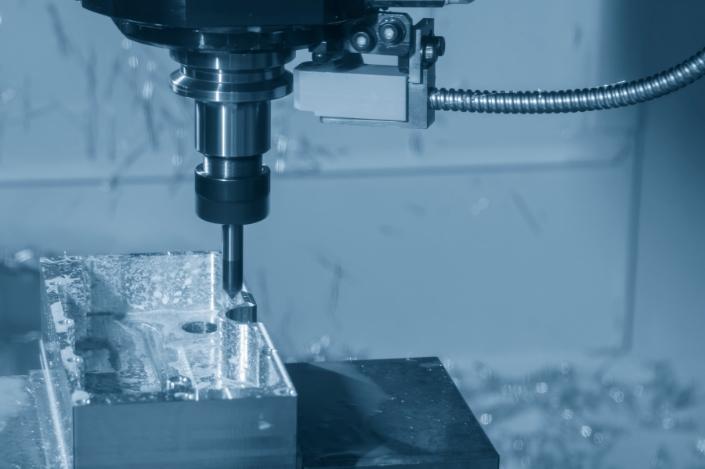CNC Milling
Aluminum Forging Machining
AL FORGE TECH CO., LTD. stands out for its highprecision, highefficiency manufacturing processes, providing customers with highquality aluminum alloy components. As one of the core technologies in the aluminum alloy forging process, CNC Milling is widely applied in the machining of aluminum alloy parts with complex shapes, whether for automotive, motorcycle, bicycle, or other industrial hardware components. CNC milling enables highprecision and highquality machining results.
Services
AL FORGE TECH CO., LTD. is committed to providing highstrength, precise aluminum alloy components, with applications spanning automotive, motorcycle, bicycle, industrial hardware, and other industries. By leveraging modern CNC technology, AL FORGE ensures precise control over various machining processes to meet customer demands for strength, durability, and precision.
Role of
CNC Milling in Aluminum Alloy Forging
CNC Milling plays a critical role in AL FORGE’s aluminum alloy forging processes, especially when dealing with highprecision, highdemand component machining. The role of CNC milling is to use a precise digital control system to cut the aluminum alloy material, removing excess material to achieve the final shape and size requirements of the part.
In aluminum alloy forging, CNC milling primarily handles semifinished parts after forging, using milling cutters for fine processing to achieve precise shapes, sizes, and surface quality. Whether it’s for creating complex inner and outer shapes, curved surfaces, or holes and grooves, CNC milling delivers highprecision machining results.
CNC Milling Process and Applications
The specific steps in CNC milling for AL FORGE’s aluminum alloy forging services can be broken down into the following main procedures:
Workpiece Preparation and Setup
First, AL FORGE selects the appropriate aluminum alloy material based on customer design requirements and cuts it into the proper shape and size. The workpiece is then installed onto the CNC milling machine’s worktable, secured using fixtures to ensure it remains stable and free from movement or deformation during the machining process.
CNC Program Setup
Based on the customer’s design drawings or CAD models, technical staff write the appropriate CNC program. These programs ensure that the milling machine operates along predetermined paths, cutting depths, and feed rates to complete the precise machining of the workpiece.
Tool Selection and Machining
In CNC milling, the appropriate milling cutter is selected based on the part’s shape, material, and machining requirements. Common cutters include end mills, face mills, and ballnose mills. Choosing the right tool increases machining efficiency and ensures the accuracy of the parts. The CNC milling machine then executes the programmed cuts, making precise movements in multiple directions to achieve the final shape of the workpiece.
Monitoring and Adjusting the Machining Process
During the machining process, AL FORGE’s technicians continuously monitor the operation of the CNC milling machine to ensure the process proceeds smoothly. If any abnormalities, such as tool wear or instability in operation, are detected, machine settings are immediately adjusted to ensure precision is maintained.
Post-Processing and Quality Inspection
After milling, the parts undergo postprocessing, including deburring and surface polishing, to improve the surface quality and appearance of the components. Subsequently, professional quality inspection is performed to ensure that all dimensions and tolerances meet the design requirements and conform to customer quality standards.
CNC Milling Applications in AL FORGE's Aluminum Alloy Forging
In AL FORGE’s aluminum alloy forging services, CNC milling is primarily applied in the following areas:
Automotive Parts Machining
Parts such as lower control arms, upper control arms, and vehicle body structures are critical components that require high strength and the ability to withstand significant impacts. CNC milling enables these parts to be machined with precise structures and dimensions, ensuring they meet the high standards of the automotive industry.
Bicycle Parts Machining
Parts such as handlebars, seat posts, and frames are subject to stringent weight and strength requirements. CNC milling ensures these parts maintain the required strength and precision while minimizing weight, all while maintaining sufficient structural stability.
Motorcycle Parts Machining
Parts like footrests and frame structures need to withstand significant external forces while maintaining stability. CNC milling can achieve highprecision machining, ensuring the durability and stability of the parts.
Industrial Hardware Parts Machining
Parts such as deepdrawn tubes, shock absorber mounts, and fasteners play crucial roles in industrial equipment. CNC milling can precisely machine complex shapes and holes, providing highquality surface finishes that ensure these parts perform reliably over extended periods.

High Precision
CNC milling achieves micronlevel machining accuracy, meeting the requirements for various complex shapes.
High Efficiency
CNC milling machines can operate continuously in an automated setting, significantly increasing production efficiency.
Complex Part Machining Capability
CNC milling can process complex threedimensional structures, whether internal or external shapes or curved surfaces, with high precision.
Stability
Due to the high precision and automation of CNC milling, the production process maintains consistent machining quality, effectively reducing human errors.
CNC Milling is an indispensable part of AL FORGE’s aluminum alloy forging services. Its precision, efficiency, and versatility make it the ideal choice for manufacturing a wide range of aluminum alloy components. Whether for automotive, bicycle, motorcycle, or industrial hardware parts, CNC milling ensures the accuracy and quality of every component, meeting various customer needs and driving the development of the entire aluminum alloy forging industry.